Once Upon a Time in China 3 (1992)
Directed by: Tsui Hark
Written by: Tan Cheung, Tin-suen Chan
Starring: Jet Li, Rosamund Kwan, Siu Chung Mok, Xing Xing
AKA WONG FEI HUNG 3: SI WONG JAANG BA
China/Hong Kong
AVAILABLE ON BLU-RAY: NOW, in EUREKA ENTERTAINMENT’S ‘ONCE UPON A TIME IN CHINA’ BOXSET
RUNNING TIME: 109 mins
REVIEWED BY: Dr Lenera, Official HCF Critic
To restore some Chinese pride at a time when Chinese sovereignty is being eroded by foreign imperialism., the Dowager Empress Ci Xi and the Prime Minister Li Hongzhang decide to stage a lion dance competition. Meanwhile Wong Fei-Hung arrives in Peking along with Leung Foon and Aunt Yee. Yee catches the eye of Russian diplomat and old classmate Tomanovsky, while Wong could be facing a new martial arts rival in Chiu Tin-bak, when Chiu attacks Wong’s father. Chiu’s henchman, Clubfoot Seven Chiu-Tsat, works for the slimy Leung Fun who is determined to win the prestigious lion dance contest at any cost.…
While I found Once Upon A Time In China 2 to be a a slight notch or two down from Once Upon A Time In China, there’s no doubt that it’s still a classy, quality product through and through, and I wouldn’t be surprised to learn that the guys doing the audio commentary are most certainly not alone in stating that the sequel is actually better. But I very much doubt that many would claim Once Upon A Time In China 3 to be in the same league as the first two. There’s nothing actually bad about it, but it seems to work at a lower level for the most part. The plot is minimal, the political aspect minimised, and much of the action involves lion dancing, leaving viewers who wanted lots of kick-ass martial arts action feeling shortchanged. It doesn’t help that what fighting there is really goes to town on the wire-fu. The first two films got the balance right in that respect so that there was still lots of fantastic skill on offer, but this one sure misses the expertise of Yuen Wing-Poo, his replacement Yuen Bun just going for fantasy much of the time and not being good enough to make the action graceful in the way that the very best wire-fu films can be. But if you accept these limitations, there’s still a fair bit of fun to be had watching this one. The Wong/Yee relationship is as cute as before and Wong’s even more of a flawed, divided character. Director Tsui Hark doesn’t seem to be even trying to match what came before, he’s just attempting to make a nice, pacy period actioner, and he certainly succeeds in doing that. It’s just that it can’t help but fall short of its illustrious predecessors.
We open with some lion dancing outside the palace of the Dowager Empress Ci Xi, and it’s nice to finally meet this important character who’s been referred to in the previous two films. Unfortunately, after the Prime Minister Li Hongzhang suggests to her that the way for China to rid itself of all these foreign countries is to let them fight amongst themselves, she replies that they should hold a lion dance, and she’s then wheeled outside to face the dancers, she then disappears from sight. O well. The opening titles give us more lion dancing [you’d better enjoy it, there’s far more to come], set to the Wong Fei Hung theme in a different arrangement, with multiple voices singing it and traditional drum backing. I think I like this version better than the more ‘poppy’ version. Now film number two ended with a kind of cliffhanger with some of our major characters separated. but that’s ignored here. We rejoin our trio of Wong, Yee and Foon, now in Beijing visiting Wong’s father. This is ostensibly because he’s just opened a medical centre, though the real reason is that Wong has some news for him. However, father almost dies laughing [literally] when he sees Yee’s western outfit, so his usually so confident son finds it hard to tell him of his engagement to Yee. I guess some may find this contradictory, but I see it as quite believable for a man who’s gradually adapting to a changing world but still struggles to say his betrothed’s actual name and is still so steeped in tradition that he objects to the western custom of kissing hands. The perpetrator of this foul deed is Russian diplomat Tumanovsky, who smells ‘villain’ so badly that I have no bones about telling you that he turns out exactly as you expect. This is kind of a shame, as it limits the interest of the love triangle. It would have been more intriguing is Tumanovsky really was a nice guy, just one with designs on Yee. After all, Foon seems to have forgotten any previous feelings about the delectable Yee he may have had.
Foon again is the source of some humour, and Max Mok isn’t as irritating as he was before, though the comedy is more shared this time. Some gags involving Yee teaching Wong some English, especially one where she gets him to say “I love you” to her even though he doesn’t know what it means, are both funny and cute. However, threat beckons in the form of Chiu Tin-bak who thinks that only his martial arts school should be the local entry into the lion dance competition, and for a while the film plays out rather like a ‘70s martial arts flick where the idea of battling martial arts schools was everywhere. However, not everything pans out as you might expect, particularly in the case of Clubfoot. Sort of a precursor to Li’s Danny The Dog [aka Unleashed], this out of control, animalistic person is set up as a major adversary for Wong, but things then go a different way which may disappoint some but which I found rather pleasing, especially considering that the character is basically disabled. The first brawl is between Wong Kei-ying’s and Chiu’s schools and you know you’re in a rather different world to before when one character runs upside down on a ceiling beam. Wong Fei-Hung first kicks into action wielding his jacket to devastating effect. His best fight scene is a bit later when, after battling Chiu using a table as a weapon, the bad guys throw some barrels containing oil at him. Wong smashes them, but the oil spills over the floor, causing Wong to slide all over the place until he realises that he can exploit the flexibility to his advantage. Jackie Chan would have turned it into a comedy scene, but Hark, Bun and Li somehow manage to keep things reasonably serious.
Some shady Russians join Chiu as villains, and the revelation of what they’re up to brings in another country as a source of evil for the series, but as far as I can remember [it’s been a while since I’ve watched them] none of the successive three sequels continue this thread. In any case, the big climax, in a film that’s already had lots of lion dancing, is – what else? – a lion dance, plus a larger scale version of the climbing competition that Chan won at the beginning of Dragon Lord, and the fact that safety is not an option and various weapons can be used means that this lengthy sequence doesn’t get boring. It must have been incredibly hard to stage. However, it still fails to reach an extra level of excitement and Hark’s overuse of slight slow motion doesn’t help in this respect, though the chaos is still easy to follow despite all the masks on display, and Li is allowed to showcase some cool stuff. Unfortunately, we’re deprived of a full one-on-one showdown. It’s obvious that Hark wanted to go down a different route with the action of this one but one can’t help but feel a bit let down, especially as much of the story just isn’t as involving as before. You do, though, get to see Li kicking a horse. This scene used to be cut, but is now restored. I assume that it was discovered that the horse wasn’t actually injured.
Some themes from before are continued. Once again, Yee’s rather too interested in a camera, this one a moving picture camera that records Li doing some moves, whereupon the people watching it complain that it’s too fast [well, Hong Kong movies do do a lot of undercranking so things play a little faster!]. It also basically reveals a crime in a very unconvincing plot point. Harm still comes to it though. The Wong/Yee relationship comes to a wonderful head when Wong thinks Yee has ran away and he runs towards her crying out her real name. Li truly sells this liberating moment. It’s just funny if you know that the real Wong was married four times so probably had little trouble expressing his feelings for members of the opposite sex. The acting all round is of a solid caliber, with even the white faces giving better performances than usual. Chiu Chin is undeniably over the top as Chiu, but his looks and the character seem to suit his portrayal. Also impressive are the hugely detailed sets, taking full advantage of the bigger budget given this entry. But Hark, while he certainly presents us with a decent looking film, is less stylish than before, something probably assisted by the change in cinematographer. It feels like he didn’t invest as much effort into this one, seeing it more as an obligation because the previous two had done so well – though according to the credits he did assist William Hu on the score, which repeats the usual themes but is also more overtly comic.
In the end though Once Upon A Time In China 3 has nothing really to be ashamed of. It doesn’t disgrace the series, but nor does it really add to it except for lots of – lion dancing. If you lower your expectations after watching the first two though, it still provides a decent amount of entertainment.
Rating: 









I probably don’t need to reiterate my previous comments about the picture and audio of this film. These restorations are fantastic across the board. I have just two minor points. Eureka obviously couldn’t get the Cantonese stereo track for this entry, but the one we have is perfectly fine apart from some odd musical glitches. I didn’t have time to check them all, but it seems like at least some of these flaws are not on the Mandarin or English audio tracks. Strange. And both this and the previous installment contain extra footage in their Taiwanese versions, so it’s a shame that Eureka couldn’t access this material. Not a big deal though.
Mike Leeder and Arne Venema provide another fine audio commentary: light, but detailed. They’re understandably a little down on this one, often pointing out flaws [a couple of which I don’t really agree with] and getting a bit more sidetracked, but I loved hearing things like how Hark’s method of pushing somebody to do better would be to say nasty things about the person’s mother, and how Leeder once came across a bootleg video of a film which he only produced but was actually featured on the cover! I really hope that Eureka employ their services on future releases, in fact I want to hear them talking over every Hong Kong film ever released. It’s like Bey Logan never happened.
The lengthy interview with John Wakefield, who gave quite a good performance as Tomanovsky, is mostly pretty interesting. He was a Mormon missionary before an actor and got into Hong Kong TV and movies to improve his Cantonese. On Once Upon A Time In China 3, because of the number of languages spoken, instructions were often translated four or five times and ended up being different to how they started, while dialogue tended to be written daily. The third part of The Legend of Wong Fei-hung goes in depth into his martial arts techniques before urging the viewer to go and see Wong Fei Hong 92: The Master, a Li film originally just called The Master which had actually been made before he first played Wong and wasn’t even about the character but not released until after the third film with a different title. The three parts of this documentary must have been originally been shown over quite a long period. The Hark interview is a little disappointing, Hark being rather cagey with his answers, though he still provides an insight into his thought processes as a filmmaker. Some behind the scenes stuff from Once Upon A Time In China shows up, which is then shown in full as the Behind the scenes footage. This is odd, as it’s not from Once Upon A Time In China 3, but it’s fascinating to watch the ladder fight being set up and see Li with his injured foot.
SPECIAL LIMITED EDITION BOXSET
*1080p presentations of all three films, sourced from a brand new 4K restorations and making their UK debuts on Blu-ray
*Original Cantonese audio tracks
*Optional Mandarin and English audio tracks
*Optional English subtitles
*Once Upon a Time in China and America [100 mins, HD] – The final chapter in the Once Upon a Time in China series, with Jet Li making a triumphant return to his most iconic role
PLUS: Collector’s booklets featuring new essays on all four films by James Oliver
ONCE UPON A TIME IN CHINA 3
*Audio commentary from martial arts cinema authority Mike Leeder and filmmaker Arne Venema
*Exclusive new video interview with actor John Wakefield [49 mins]
*The Legend of Wong Fei-hung Part Three [12 mins] – a three-part featurette on the legendary folk hero
*Archival Q&A with Tsui Hark [23 mins]
*Archival interview with actor John Wakefield [11 mins]
*Behind the scenes footage [6 mins]
*Theatrical trailer
ONCE UPON A TIME IN CHINA AND AMERICA review Coming Soon!

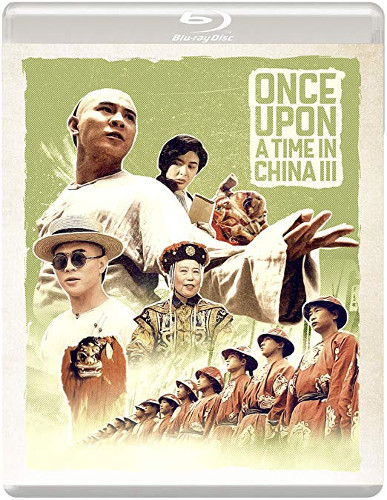
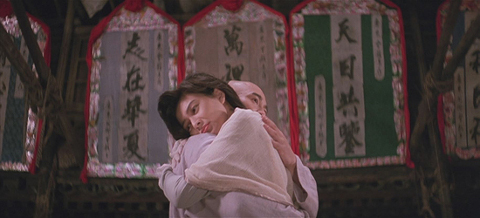
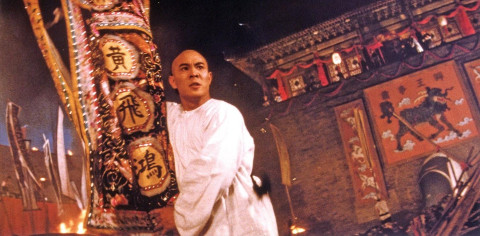

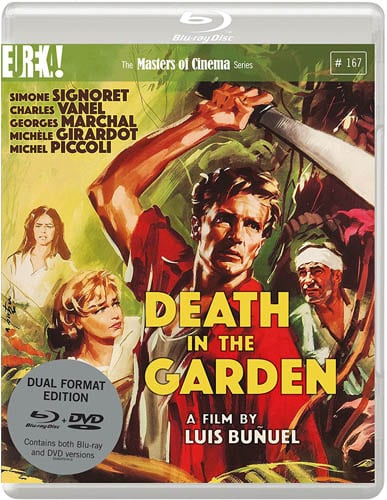
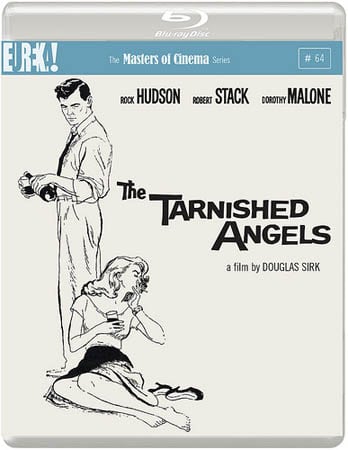
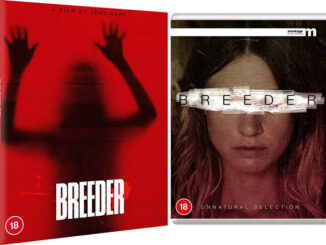
Be the first to comment